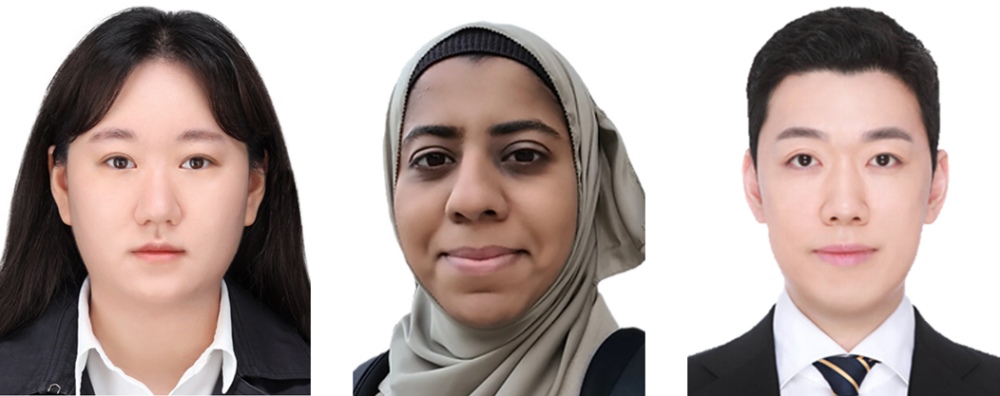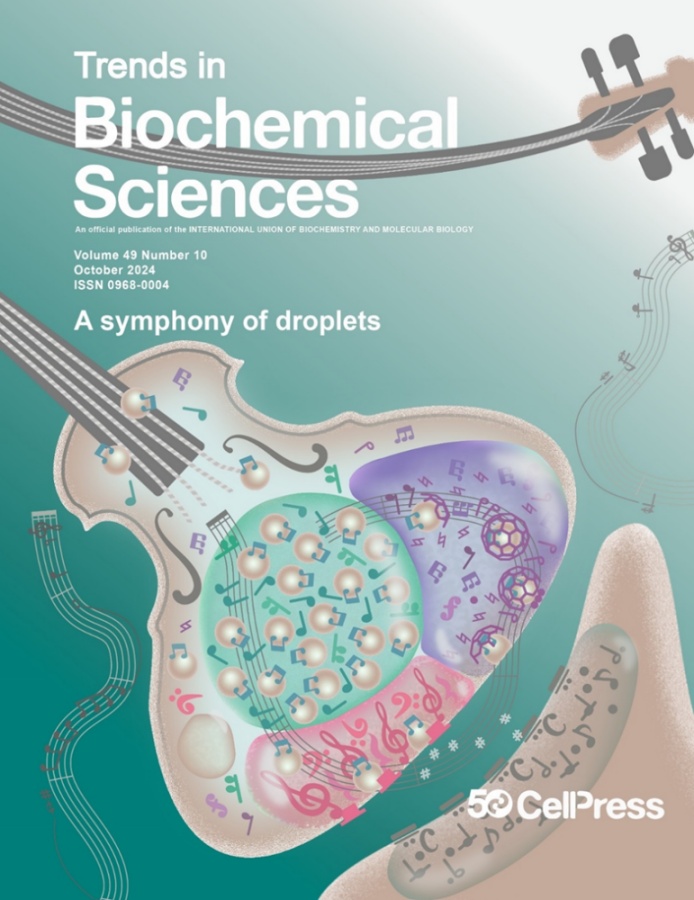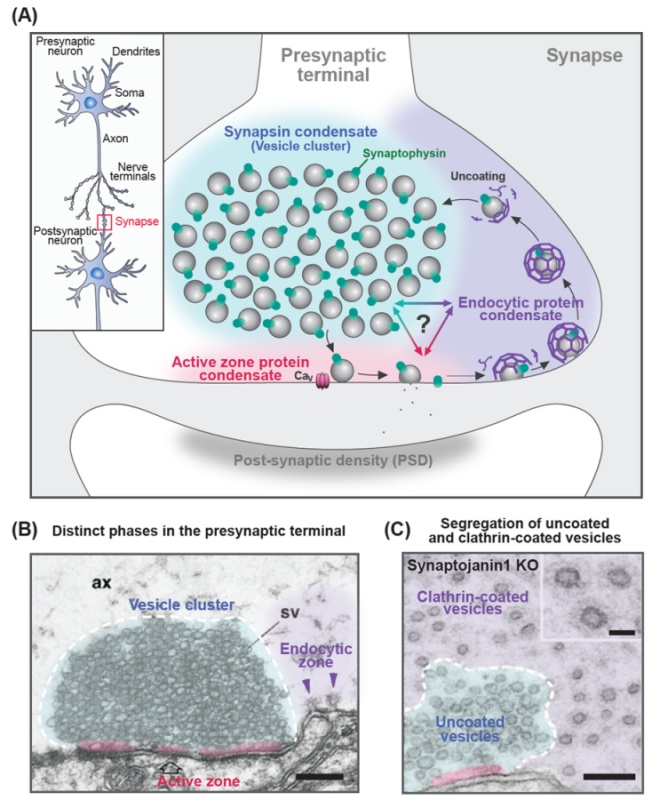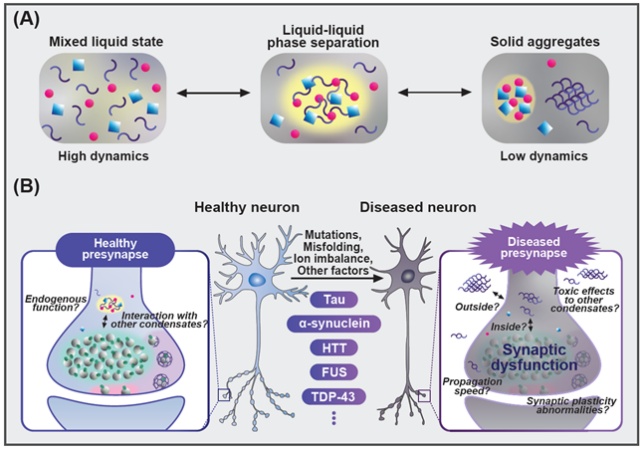Professor Dae-hun Park's Team's “Review of Liquid-Liquid Phase Separation (LLPS) Phenomenon at...
- Writer :External Affairs Team
- Date :2024.10.21
- Views :228
Professor Dae-hun Park's Team's “Review of Liquid-Liquid Phase Separation (LLPS) Phenomenon at Presynaptic Terminals” Featured as the Cover Article in an International Academic Journal
- A joint research from Catholic University of Korea's Department of Medical and Biological Science and the University of Tübingen in Germany presents a correlation between LLPS and Alzheimer's and Parkinson's brain disorders
- Selected as the cover article for “Trends in Biochemical Sciences (IF=11.6),” an influential publication in biochemistry and molecular biology

* Photo description: (From left) Ji-young Choi, a student in the combined master's and doctoral program (first author from the Catholic University of Korea Graduate School, Department of Biotechnology), Professor Nisha Mohd Rafiq (co-author from the University of Tübingen), and Professor Dae-hun Park (corresponding author from the Catholic University of Korea, Department of Medical and Biological Science)
The review paper on “Liquid-Liquid Phase Separation at the Presynaptic Terminal of Neurons,” which was conducted jointly by the research team of Professor Dae-hun Park of the Department of Medical and Biological Science, Catholic University of Korea (President Jong-chul Won) and the research team of Professor Nisha Mohd Rafiq of the University of Tübingen, Germany, was selected as the cover paper for the October issue of “Trends in Biochemical Sciences” (IF=11.6, top 4.6% in the field), an authoritative journal in the field of biochemistry and molecular biology and a sister journal of Cell.
The liquid-liquid phase separation (LLPS) is a theory that macromolecules, including proteins, can spontaneously aggregate to form functional compartments within cells without a physical barrier, such as a lipid membrane. In recent years, there has been a growing recognition that the liquid-liquid phase separation phenomenon in neurons is crucial for the pathogenesis and treatment of brain diseases. This results from the numerous research findings that have indicated that abnormal protein aggregation is associated with neurodegenerative diseases like Alzheimer's and Parkinson's.
In response to this, Professor Dae-hun Park of the Department of Medical and Biological Science at Catholic University of Korea and Professor Nisha Mohd Rafiq of the University of Tübingen in Germany, who is currently conducting research on the liquid-liquid phase separation phenomenon in Parkinson's disease co-authored this review paper. Professor Park drew on his experience of publishing the first in vivo experimental results that the liquid-liquid phase separation phenomenon is involved in the aggregation of synaptic vesicles in the presynaptic terminals of neurons in the SCIE-level journal “Nature Communications (IF=14.7)” in 2021 and 2023. This research was conducted with support from the BK21 Four project. The first author of this research was Ji-young Choi, a combined master's and doctoral student in the Department of Biotechnology at Catholic University of Korea.
The research team examines in the review paper the consistent physicochemical characteristics of the actual liquid-liquid phase separation phenomenon with the various phenomena observed in the presynaptic terminal. They also systematically summarize the characteristics of various presynaptic terminal proteins predicted to induce the liquid-liquid phase separation phenomenon in the presynaptic terminal using previous research results.
In particular, the team predicted the disordered region of the protein that is anticipated to be a significant factor in the formation of the liquid-liquid phase separation phenomenon using the protein structure prediction AI model “AlphaFold,” which was awarded the Nobel Prize in Chemistry this year. The team then presented a variety of potential ways in which the liquid-liquid phase separation phenomenon of the protein could regulate the function of actual nerve cells through comparative analysis with the results of previously known gene knockout experiments.
Furthermore, they underscored the significance of the liquid-liquid phase separation phenomenon in the maintenance of the presynaptic terminal of nerve cells and the development of neurological diseases. This was achieved by presenting a variety of perspectives on the process by which the dysfunction of the liquid-liquid phase separation phenomenon results in neurodegenerative diseases, including Alzheimer's and Parkinson's.
Professor Dae-hun Park of the Department of Medical and Biological Science at Catholic University of Korea stated, “Numerous studies have been conducted since the recent assertion that the liquid-liquid phase separation phenomenon could have a significant impact on actual living cells. However, the role and function of the liquid-liquid phase separation phenomenon in neurons remain largely unknown.” He further stated, “I hope that this review paper will provide a direction for future research on the liquid-liquid phase separation phenomenon in presynaptic terminals and make a significant contribution to the study of the pathogenesis and treatment of brain diseases.”



* Photo description: The correlation between the liquid-liquid phase separation phenomenon and neurodegenerative diseases

